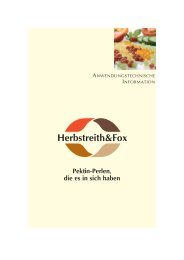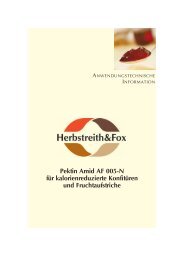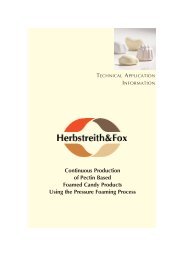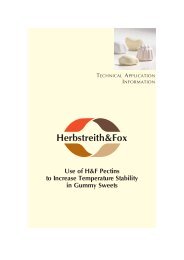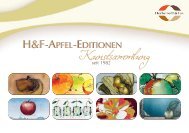The Specialists for Pectin - Herbstreith & Fox
The Specialists for Pectin - Herbstreith & Fox
The Specialists for Pectin - Herbstreith & Fox
Create successful ePaper yourself
Turn your PDF publications into a flip-book with our unique Google optimized e-Paper software.
8<br />
Your texture requirements<br />
determine<br />
the choice of the<br />
suitable pectin.<br />
All Important: Degree of Esterification<br />
and Gelling Properties.<br />
<strong>Pectin</strong>s are divided into three groups<br />
on the basis of their different gelling<br />
properties.<br />
High Ester <strong>Pectin</strong>s<br />
(HM <strong>Pectin</strong>s)<br />
<strong>The</strong>se pectins have usually a more than<br />
50% share of esterified polygalac turonic<br />
acid units (DE°), thus practically no<br />
reaction with calcium ions occurs. <strong>The</strong><br />
gel strength depends, among<br />
others, on acid content, type of<br />
pectin, concentration and soluble<br />
solids content, which generally<br />
has to be more than<br />
55%.<br />
<strong>The</strong> degree of esterification correlates<br />
with the gel setting rate and gel texture<br />
under otherwise similar conditions. Very<br />
high esterified pectins jellify quicker resp.<br />
at higher temperatures and <strong>for</strong>m more<br />
elastic and brittle gel textures than less<br />
esterified pectins.<br />
This accurate correlation<br />
requires a very hom<br />
o gene ous inter- and<br />
intramolecular car boxyl<br />
group distribution, as is especially given<br />
in Classic Apple <strong>Pectin</strong>s from <strong>Herbstreith</strong><br />
& <strong>Fox</strong>. Due to a blockwise distribution of<br />
carboxyl groups Classic Citrus <strong>Pectin</strong>s<br />
with the same degree of esterification<br />
will <strong>for</strong>m gels with a slightly higher setting<br />
temperature and a more elasticbrittle<br />
texture than Classic Apple <strong>Pectin</strong>s.<br />
<strong>The</strong> blockwise carboxyl groups distribution<br />
of high methylester pectins additionally<br />
provides advantages regarding<br />
protein stabilization in acidified milk<br />
drinks.<br />
Low Ester <strong>Pectin</strong>s<br />
(LM <strong>Pectin</strong>s)<br />
<strong>Pectin</strong>s with less than 50% share of esterified<br />
polygalacturonic acid units (DE°)<br />
can jellify with calcium ions. LM pectins<br />
thus do not only <strong>for</strong>m gels with sugar and<br />
acids, but at less soluble solids mainly<br />
with calcium ions. <strong>The</strong> resulting gel<br />
strength is determined by pectin concentration,<br />
type of pectin,<br />
soluble solids content,<br />
pH range and the<br />
concentration of buffer<br />
salts and calcium ions.<br />
A well matched balance<br />
between pectin and cal cium concen -<br />
tra tion wi ll lead to an op timal texture.<br />
Exceeding the calcium optimum will produce<br />
a brittle gel with tendency towards<br />
syneresis (loss of water from the gel) or,<br />
in the end, to the <strong>for</strong>mation of calciumpectinate,<br />
the insoluble calcium salt of<br />
pectin.<br />
Since gel setting with LM pectins is also<br />
possible with a low soluble solids content<br />
and at a high pH-value, this opens up<br />
numerous application possibilities in<br />
dietetic and dairy products.<br />
Amidated <strong>Pectin</strong>s<br />
(HM- and LM Amidated<br />
<strong>Pectin</strong>s)<br />
In case of amidated pectins ammonia instead<br />
of acids is used <strong>for</strong> deesterification<br />
and with that part of the ester<br />
groups is replaced by amide groups. This<br />
process modifies the gelling properties<br />
in comparison to acid deesterified<br />
pectins.<br />
LM amidated pectins, just like non-amidated<br />
pectins, require<br />
calcium ions <strong>for</strong> gelling.<br />
<strong>The</strong>y will already set<br />
suf ficiently with only minor<br />
calcium amounts<br />
present. Furthermore,<br />
the gel setting temperature<br />
of ami dated pectins is less influenced<br />
by the calcium dosage.



